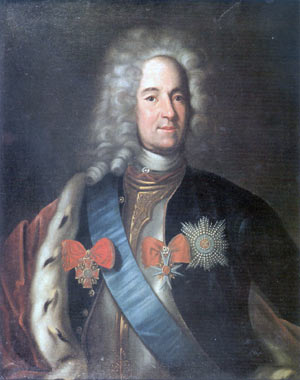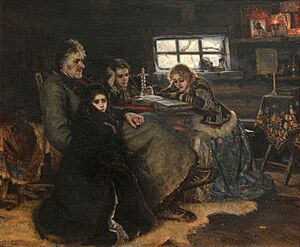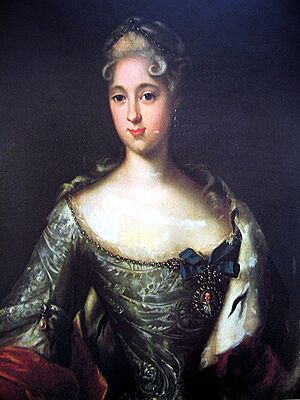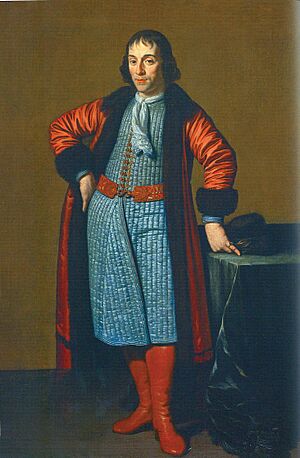Alexander Danilovich Menshikov facts for kids
Quick facts for kids
Alexander Danilovich Menshikov
|
|
|---|---|
 |
|
| Generalissimo of the Russian Imperial Army | |
| In office 1727–1728 |
|
| Preceded by | Aleksei Shein |
| Succeeded by | Duke Anthony Ulrich of Brunswick |
| Admiral of the Russian Imperial Navy | |
| In office 1726–1728 |
|
| Preceded by | Thomas Gordon |
| Succeeded by | Martin Gossler |
| Member of the Supreme Privy Council | |
| In office 1726–1728 |
|
| Preceded by | Position established |
| Succeeded by | Vasily Lukich Dolgorukov |
| 1st President of the College of War | |
| In office 1717–1724 |
|
| Preceded by | Position established |
| Succeeded by | Anikita Repnin |
| Member of the Governing Senate | |
| In office 1711–1728 |
|
| Preceded by | Position established |
| Field Marshal of the Russian Imperial Army | |
| In office 1709–1728 |
|
| Preceded by | Boris Sheremetev |
| Succeeded by | Anikita Repnin |
| 1st Governor-General of St. Petersburg | |
| In office 1702–1724 |
|
| Preceded by | Position established |
| Succeeded by | Pyotr Apraksin |
| Personal details | |
| Born | 16 November 1673 Moscow, Tsardom of Russia |
| Died | 23 November 1729 (aged 56) Beryozovo, Russian Empire |
| Spouse | Darya Mikhailovna Arsenyeva |
| Children | Maria Menshikova Alexandra Alexandrovna Menshikov Alexander Alexandrovich Menshikov |
| Awards | Titles Prince of the Russian Empire Prince of the Holy Roman Empire 1st Duke of Ingria 1st Duke of Cosel Orders Order of St. Andrew Order of St. Alexander Nevsky Order of the Black Eagle Order of the White Eagle Order of the Elephant |
| Military service | |
| Allegiance | |
| Branch/service | |
| Years of service | 1699–1728 |
| Rank | Generalissimo |
| Battles/wars | Great Northern War
|
Prince Aleksander Danilovich Menshikov (Russian: Алекса́ндр Дани́лович Ме́ншиков; 16 November 1673 – 23 November 1729) was a very important Russian leader. He held many high titles, including Generalissimo (the highest military rank), Prince of the Russian Empire, and Duke of Ingria. He was a close friend and helper to Tsar Peter the Great. For a short time, from 1725 to 1727, he was the real ruler of Russia.
Contents
Early Life and Rise to Power
Aleksander Menshikov was born in Moscow on 16 November 1673. Some stories say he came from a very humble background. He might have even sold pirozhki (stuffed buns) on the streets when he was young.
His smart personality and good looks caught the eye of Franz Lefort, who was a favorite of Tsar Peter. Lefort took Menshikov into his service. Later, Menshikov began working directly for Tsar Peter. When Lefort died in 1699, Menshikov became Peter's most trusted friend and advisor.
Menshikov was very active in Peter's military campaigns. He fought in the Azov campaigns against the Ottoman Empire. He even traveled with Peter on his first trip abroad. In Amsterdam, Menshikov worked alongside the Tsar in a shipyard. He learned a lot about building ships and also picked up some Dutch and German.
He played a key role in the Great Northern War. He fought in important battles like the Battle of Holowczyn and the famous Battle of Poltava in 1709. After the victory at Poltava, he earned the high rank of field-marshal.
Challenges and Influence
Menshikov was given a lot of power, especially as the governor-general of Ingria. He understood Peter's big plans for Russia and helped the Tsar with many important projects. However, Menshikov also used his powerful position to gain wealth unfairly. This often got him into trouble.
Tsar Peter heard many complaints about Menshikov taking things he shouldn't. In 1711, Peter became very angry when he found out Menshikov had taken money in Poland. Peter warned him to change his ways. Later, in 1713, Menshikov was involved in another scandal where he was accused of taking a lot of money from the government. He was very lucky to escape serious punishment because Peter was still fond of him.
In 1714, Menshikov was even chosen as a Fellow of the Royal Society, which showed his importance. Towards the end of Peter's rule, more accusations of unfair dealings came up. Menshikov had to ask Empress Catherine for help.
When Peter the Great died in 1725, Menshikov played a big part in making Catherine the new Empress. He believed that Catherine would continue Peter's modern ideas for Russia. Her becoming Empress also helped Menshikov keep his own wealth and power safe.
Absolute Power and Downfall

During Catherine's short time as Empress (1725–1727), Menshikov was almost the complete ruler of Russia. He even promoted himself to the highest military rank, Generalissimo. He was the only Russian at that time to hold a princely title. He built a grand home called the Menshikov Palace in St. Petersburg. Some people even called him "half-tsar" because of his great power.
Menshikov generally ruled well, but his desire for power was strong. After Catherine died, he found a way to keep his power. He helped the young Peter II, who was still a boy, become the new Tsar. Menshikov then became the main decision-maker while Peter II was too young to rule.
He planned to make his power permanent by having his daughter, Maria, marry Tsar Peter II. However, some old noble families, like the Dolgorukovs, worked together to bring him down. They managed to remove him from all his important jobs and titles.
On 20 September 1727, Menshikov was sent away from the capital. He lost all his huge wealth and titles. He and his whole family were sent far away to Beryozovo in Siberia. He died there on 23 November 1729. His wife, Darya Mikhailovna, died on the way to exile in 1728.
According to a story, Tsar Peter the Great once punched Menshikov twice. This happened after Peter saw Menshikov dancing with his sword still on, which was considered very rude.
Menshikov built a small wooden church in Beryozovo. He buried his daughter, who also died in exile, there. Menshikov's younger children survived their time in exile and were later allowed to return to court.
Palaces
-
Oranienbaum, Lomonosov
Children

- Princess Maria Alexandrovna (26 December 1711 – 1729): She was engaged to Grand Duke Peter of Russia. She died of smallpox while in exile with her father.
- Princess Alexandra Alexandrovna (17 December 1712 – 13 September 1736): She married Gustav von Biron. She died during childbirth.
- Prince Alexander Alexandrovich, Duke of Ingria (March 1714 – 27 November 1764): He was engaged to Grand Duchess Natalia Alexeyevna. He later married Princess Yelizaveta Petrovna Golitsyna and had children.
See Also
- Alexander Sergeyevich Menshikov – his great grandson.
 | Kyle Baker |
 | Joseph Yoakum |
 | Laura Wheeler Waring |
 | Henry Ossawa Tanner |




